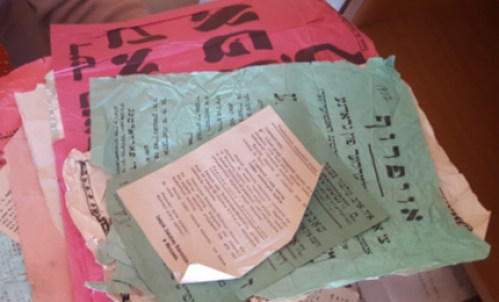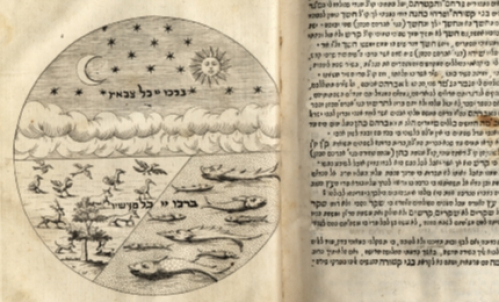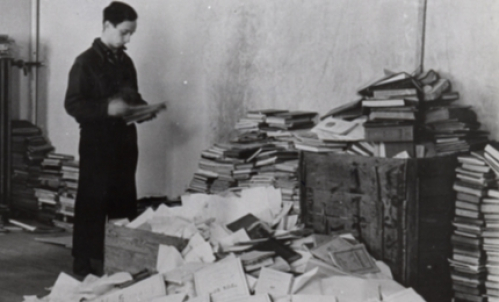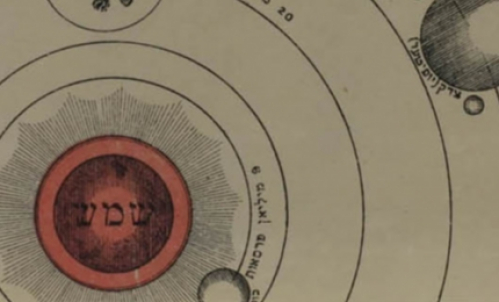YIVO Celebrates Yuval Waldman's 70th Birthday with a Benefit Concert

When:
Wednesday December 21st, 2016 | 7:00pm-8:30pm
Where:
YIVO at the Center for Jewish History | 15 West 16th Street, New York, NY 10011
Tickets are $15, $10 Students and Members
All tickets are $20 at the door
Reservations Available at: yivo.org/Yuval-Waldman-Concert-Celebration
New York, NY – The YIVO Institute for Jewish Research will be featuring a concert for the occasion of violinist and champion of Jewish music Yuval Waldman’s 70th birthday. Yuval Waldman will play a recital-lecture of works by Jewish composers which he commissioned or gave the premiere performance of. The program will include Thoughts and Feelings, a never before heard work by Joachim Stutschewsky which Stutschewsky wrote in 1981 at the age of 90, Variations on "Hatikvah" by Yehiel Goyzman, Waltz from an Unknown Country by Paul Alan Levi (U.S. Premiere), the world premiere of a new work by Alex Weiser, and Fantasy on "Jerusalem of Gold" by Yuval Waldman himself. All of the living composers will be in attendance to introduce their works and celebrate this occasion at YIVO. A free reception will follow the concert. This event is co-sponsored by American Society of Jewish Music.
This program is a benefit for the Sidney Krum Young Artists Concert Series. The concert series is devoted to rarely heard masterworks from the Sidney Krum Jewish Music and Yiddish Theater Memorial Collections at YIVO, performed by gifted young artists from the Juilliard School, the Manhattan School of Music and other premier conservatories in the metropolitan New York area.
Program
- Yuval Waldman (2006) Fantasy on "Jerusalem of Gold"
- Paul Alan Levi (2015) "Waltz from an Unknown Country" – First American performance
- Alex Weiser (2016) "Lullaby" – First performance
- Joachim Stutschewsky (1969) “Thoughts and Feelings” – First performance
-
Yehiel Goyzman (1905) Variations on "Hatikvah"
For press inquiries, contact:
Alex Weiser
Director of Public Programs
(212) 294-6152
About the Program
Yuval Waldman (2006) Fantasy on "Jerusalem of Gold"
“Jerusalem of Gold” was composed by renowned Israeli composer Naomi Shemer in 1967, and immediately become one of the most popular Israeli songs. Inspired by the song, Yuval Waldman composed this improvisation-like fantasy, which he performed in the spring of 2005, for the first concert of Jewish music in Almaty, Kazakhstan. Waldman dedicated the piece to Erulan Kanapyanov – a composer, friend, and the President of Eurasian Arts Foundation in Kazakhstan. The fantasy combines virtuoso violin variations with the mysterious, ghostly sounds of eternal Jerusalem.
Violinist and conductor Yuval Waldman has been described as “brilliant” (Musical America) and “spectacular” (The New York Times). Born in the Ukraine to Holocaust survivors, Waldman played his first public performance at the age of 8. He was educated in Israel, Europe, and the United States, after which he made his New York debut on the International Series at Carnegie Hall, Jeunesse Musicales.
Waldman has appeared as a violin soloist with dozens of prominent orchestras in the United States, Canada, Europe and Israel and given recitals at Carnegie Hall, Lincoln Center, The Kennedy Center, Wigmore Hall in London, and Concergebouw in Amsterdam. He has performed with such artists as Isaac Stern, Pinchas Zukerman, Jean-Pierre Rampal, Maureen Forrester, and Henryk Szeryng. He is the first violinist in the acclaimed Kinor String Quartet, a winner of the America-Israel Cultural Foundation Prize, and the Distinguished First Prize at the Conservatory of Geneva. He has recorded on the Angel, Newport Classics, Omega Classica, CRI, Musique International, and Musical Heritage Society record labels.
Maestro Waldman’s career as a conductor includes performances and recordings with several of the orchestras listed above, as well as the New American Chamber Orchestra, the Midatlantic Chamber Orchestra; the Philadelphia Chamber Orchestra, and the Cologne Opera. He celebrated the fiftieth anniversary of the founding of Israel in Moscow and conducted the memorial concert on the steps of Congress on September 11, 2002. He was the founding music director of the Madeira Bach Festival, the Jefferson Music Festival in Washington D.C., the Opus Berkshire Festival in Massachusetts and the Benedictine Millenium Festival in Rome. He has served as director of the World Bank Mozart Festival and the Midatlantic Chamber Orchestra.
Waldman has recently been presenting rarely-performed gems composed by Eastern European Jews, many of whom perished during World War II or were silenced by Soviet repression. As Artistic Director of Music Bridges International, Mr. Waldman was able to rediscover these pieces by searching music libraries and obscure music collections in Russia, Ukraine, Czech Republic and Israel. They represent a wide spectrum of stylistic influences on Jewish composers: impressionistic, neoclassical, folk and Klezmer. These pieces fill an unexplored gap in early twentieth century Jewish music repertory which fully deserves to be heard today.
Since 2010 Yuval Waldman has been the Artistic Director of the Krum Young Artists Series at the YIVO Institute for Jewish Research. He is the Artist in Residence at the University of Science and Arts in Oklahoma, and a frequent performer at the Prague Cathedral in Czech Republic.
Paul Alan Levi (2015) "Waltz from an Unknown Country"
First American performance
Paul Alan Levi (born June 30, 1941 in New York) is a Jewish American composer whose compositions have been performed in Carnegie Hall, among other major venues in United States and Europe, as well as on national television. He is also famously known as the composer of the music which accompanied PBS’s logo in their on TV ident from 1971-1984. Levi received a B.A. in music at Oberlin College and later received his M.M. and D.M.A at Juilliard while studying with composition teachers Hall Overton and Vincent Persichetti. Levi has taught at the Aaron Copland School of Music, Rutgers University, Manhattan School of Music, New York University, Lehman College, and Baruch College, and has been the composer in residence at Wolf Trap Farm Park, Portland State University, and the White Plains High School.
Levi has won numerous awards and grants including a Guggenheim Fellowship, the Grand Prize for Opera from the National Music Theater Network, Fellowships from the National Endowment for the Arts, the American Composers Alliance Recording Award, and grants from the American Music Center and Meet the Composer. He lived for a year in Munich on a DAAD Grant and has had residencies at several artist colonies.
Levi’s commissions include the Chamber Music Society of Lincoln Center, New York Choral Society, New Amsterdam singers, New York Chamber Symphony, Chamber Music Northwest, Robert DeCormier Singers, and the Music Today Series. Performers of his music include conductors Pierre Boulez, Jesús López-Cobos, Robert DeCormier, Clara Longstreth, Gustav Meier, and Gerard Schwarz; pianist Justin Kolb; and singers Margaret Ahrens, David Bender, Adam Klein, Antonia Lavanne, Douglas Perry, Neva Pilgrim, Lucy Shelton, Sheila Schonbrun, and James Archie Worley, as well as Cantors Richard Botton and Mark Lipson.
Publishers include Becatone Music, Lawson-Gould Music Publishers, Margun Music, Merion Music, Mobart Music Publications, and New Jewish Music Press. Recordings can be heard on Albany Records (Acts of Love; Bye, Bye Toots), Centaur Records (Mark Twain Suite), and CRI (Five Progressions for Three Instruments). Levi writes, “I try to compose with a comedian’s sense of timing, even in non-comedic works. I think of my music as a gift to a community consisting of the composer, the performers, and the listener.” His pieces feature a combination of lyricism, drama, intelligence, and energy, often with an underlying or overt sense of humor. He has a taste for quirky and unusual texts for his choral and vocal works, including the prose of Mark Twain, works of poets Robert Burns, Sally Fisher, Randall Jarrell, Toni Mergentime Levi and others, as well as passages from the Old Testament and Holocaust writings.
Like many composers, Mr. Levi has written memorial works, but he has also composed a piece celebrating birth, “In the Womb,” for chorus with electronic accompaniment. His most significant works, both for chorus, orchestra, and soloists, include the comedic Mark Twain Suite, as well as his gripping and dramatic Passover Oratorio, Dayenu, both premiered in Carnegie Hall.
Alex Weiser (2016) "Lullaby"
First performance
Lullaby was written as a gift to Yuval Waldman on the occasion of his 70th birthday and receives its premiere this evening. The work revels in a soft-spoken peaceful lilting soundscape, hovering just short of any musical resolution until its final conclusion. With an ample use of open string double-stops, left hand pizzicato, and expressive speeding up and slowing down, Weiser makes subtle reference to the rustic sound world of the fiddle.
Broad gestures, rich textures, and narrative sweep are hallmarks of the “compelling” (New York Times), “shapely, melody-rich” (Wall Street Journal) music of composer Alex Weiser (b.1989). Born and raised in New York City, Weiser creates acutely cosmopolitan music combining a deeply felt historical perspective with a vibrant forward-looking creativity. Weiser has been praised for having a “sophisticated ear and knack for evoking luscious textures and imaginative yet approachable harmonies.” (I Care If You Listen).
An energetic advocate for contemporary classical music and for the work of his peers, Weiser co-founded and directs Kettle Corn New Music, an “engaging” (New York Times) series acclaimed for capturing “all of the prestige” that contemporary classical music has to offer, with “none of the pomp,” (Feast of Music) and was for nearly five years a director of the MATA Festival, the “the city’s leading showcase for vital new music by emerging composers.” (The New Yorker). Weiser is now the Public Programs Manager at the YIVO Institute for Jewish Research where he curates and produces programs that combine a fascination with and curiosity for historical context, with an eye toward influential Jewish contributions to the culture of today and tomorrow.
Weiser's musical education began in earnest while attending Stuyvesant High School writing pieces for the symphonic orchestra there, and studying theory and conducting with Joseph Tamosaitis, and composition with Paul Alan Levi. Weiser then continued his studies at Yale University and New York University where teachers and mentors included Michael Gordon, Julia Wolfe, Michael Klingbeil, Kathryn Alexander, Martin Bresnick, David Lang, Ingram Marshall, and Christopher Theofanidis.
Joachim Stutschewsky (1969) “Thoughts and Feelings”
First performance
From 1924 to 1927 Stutschewsky was the cellist of the Kolisch Quartet (then called the New Vienna String Quartet), which grew out of Arnold Schoenberg’s “Society for Private Musical Performances” and was heavily influenced by Schoenberg’s musical style and teaching. Though Stutschewsky spent most of his life writing and championing Jewish music influenced by Klezmer and other Jewish musical traditions, in this composition he returns to the influence of Schoenberg writing a dense and dissonant musical meditation. Stutschewsky wrote this work in 1969 and dedicated it to Yuval Waldman after they met each other shortly thereafter.
Joachim Stutschewsky (1891-1982) was a composer, cellist, musicologist, and folklorist born in Romni, Ukraine in 1891 to a well-known family of klezmer musicians. A precocious musician, Stutschewsky began playing violin at the age of 5 and cello at the age of 11. Stutschewsky studied at the Lepizig Conservatory with Julius Klengel (1909-1911), and then led an international career playing and teaching cello and organizing concerts of Jewish music. Stutschewsky lived in Zürich from 1918-1924 and moved to Vienna in 1924 where he was one of the founding members of the New Vienna String Quartet (later known as the Kolisch Quartet), which premiered important works of Arnold Schoenberg. At the same time he remained dedicated to promoting Jewish music infused with klezmer music, in the vein of the Society for Jewish Folk Music. In 1938 Stutschewsky moved to pre-state Palestine where he taught cello, performed, lectured, and championed the music of Israeli composers through a new music series he started in Tel Aviv. Stutschewsky died on November 14th, 1982 in Tel Aviv, Israel. His archive can be found in the Felicja Blumental music library in Tel Aviv.
Yehiel Goyzman (1905) Variations on "Hatikvah"
The Variations on “Hatikva” (the hope) were written in the early 1900s, shortly after “Hatikvah” became the official Zionist anthem in 1887. The anthem’s text was written by Naftali Herz Imber, and the melody, of folk origin, was composed by Samuel Cohen. “Hatikvah” is now the anthem of the State of Israel. The Variations are written for violin solo, in the genre of a klezmer concerto, in the form of demanding variations with an improvised introduction. Yuval Waldman gave the first modern performance of these variations in October 2010 in Jerusalem.
Yehiel Goyzman (1849-1913) was a virtuoso klezmer violinist and composer, better known as Alter Chudnover, after his Ukrainian birthplace of Chunov. He received his classical music training in Warsaw. As a bandleader and a composer, Goyzman introduced new professional standards to the klezmer music of his time. His klezmer band was widely known in Ukraine and he was often invited to play for various occasions, ranging from wealthy Hassidic weddings to Zionist gatherings. Goyzman’s music was only recently discovered by musicologist Dr. Lyudmila Sholokhova in the Vernadsky Library in Kiev.
About YIVO
The YIVO Institute for Jewish Research is dedicated to the preservation and study of the history and culture of Eastern European Jewry worldwide. For a century, YIVO has pioneered new forms of Jewish scholarship, research, education, and cultural expression. Our public programs and exhibitions, as well as online and on-site courses, extend our global outreach and enable us to share our vast resources. The YIVO Archives contains more than 24 million original items, and YIVO’s Library has over 400,000 volumes—the single largest resource for such study in the world. yivo.org / yivo.org/the-whole-story



